Think of something big and important happening in the world—some cultural trend, political movement, or social craze. Chances are that someone, somewhere, has proposed giving it a distinctly “Christian” or “biblical” framing. Some of these efforts, aimed at glorifying God in all things, supply helpful correctives to secular errors. Others, smacking more of anxious attempts at hopping aboard a moving train, add little beyond a thin spiritual gloss.
Thankfully, CT’s book of the year, Christopher Watkin’s Biblical Critical Theory: How the Bible’s Unfolding Story Makes Sense of Modern Life and Culture, belongs to the first category. Some might wince at the mention of critical theory, with its perceived reputation for nonsense jargon or radical politics. Critical theory comes in many flavors, of course, some guiltier than others of cramming messy human particulars into ideological straitjackets. But the late Tim Keller, in his foreword, suggests another view, observing that a good theory “make[s] visible the deep structures of a culture in order to expose and change them.”
As Watkin contends, Scripture does this better than anything else. Other critical theories—derived from deep analyses of race, gender, psychology, language, and law—might apply useful lenses to reality. But all are clouded or cracked to some degree, requiring a higher wisdom and a truer story to polish off the smudges and patch together the broken shards. God’s Word, in this sense, does more than explain God to the world. In unsurpassed fashion, it explains the world to itself.
Like Biblical Critical Theory, all of our award winners contain insight and beauty on their own. And like all good books, they are made complete in the greatest Book of all. —Matt Reynolds, senior books editor
Apologetics/Evangelism
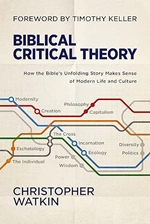
Biblical Critical Theory: How the Bible’s Unfolding Story Makes Sense of Modern Life and Culture
Christopher Watkin (Zondervan Academic)
Biblical Critical Theory is an outstanding example of careful scholarship employed for the life of the church. Watkin leads the reader through a comprehensive account of the biblical narrative. At each scene in this narrative, he shows how complex biblical truths are often divided into false dichotomies or watered-down compromises. He argues, in contrast, that biblical teaching cuts across these divides and subverts cultural expectations. Watkin travels with ease from biblical exegesis to intellectual history to contemporary philosophy. Scholars, teachers, and pastors will all benefit from this work. I cannot recommend it highly enough. — Gregory E. Ganssle, professor of philosophy, Biola University
(Read an excerpt from Biblical Critical Theory, as well as an interview with the author.)
Award of Merit
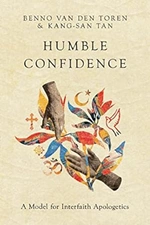
Humble Confidence: A Model for Interfaith Apologetics
Benno van den Toren and Kang-San Tan (IVP Academic)
Humble Confidence offers a fresh integration of evangelism, missiology, and apologetics. With uncommon clarity and grace, the authors bring these insights to bear on the complexities of the modern world, particularly the many religious viewpoints and expressions embedded in innumerable cultural contexts. Crucially, they retain a commitment to rational defense of the Christian faith while resisting the power struggles, logic chopping, and depersonalization that often accompany apologetic efforts. What results is a holistic model of interfaith engagement that honors and respects the bodies, minds, hearts, and souls of all involved. — Marybeth Baggett, professor of English and cultural apologetics, Houston Christian University
Finalists
The Augustine Way: Retrieving a Vision for the Church’s Apologetic Witness
Joshua D. Chatraw and Mark D. Allen (Baker Academic)
Justin Brierley (Tyndale Elevate)
(Read CT’s review of The Surprising Rebirth of Belief in God.)
Bible and Devotional
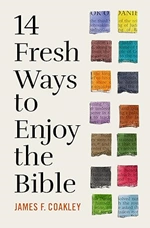
14 Fresh Ways to Enjoy the Bible
James F. Coakley (Moody)
It’s easy to get stuck in our approaches to the Bible—reading it from a certain perspective, asking the same questions of each text, defaulting to familiar ways of interpreting it, or even just getting bored with our old routines. This book offers 14 ways to look at Scripture with fresh eyes, not only revealing meanings and emphases we may have missed but also illuminating the artistry and ingenuity of biblical authors and the Spirit who inspired them. Coakley’s explanations of each concept, as well as examples from biblical and nonbiblical works, will help readers deepen their understanding of Scripture and appreciate its literary beauty. — Chris Tiegreen, author of numerous devotional books and Bible study guides
Award of Merit
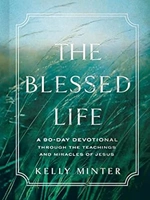
The Blessed Life: A 90-Day Devotional through the Teachings and Miracles of Jesus
Kelly Minter (B&H)
Minter provides a contemplative exploration of a short period in Jesus’ earthly life. Readers walk alongside Christ’s disciples, encountering crowds, misfits, and sufferers while hanging on to the Messiah’s every word. With gracefully short and profound chapters, The Blessed Life illustrates the ongoing relevance of Jesus’ teachings and miracles for building and sustaining faith in today’s world. Minter’s powerful writing helps us receive Jesus’ words the way his original audience did—as new, fresh, and brimming with hope. — Eryn Lynum, Bible teacher, author of Rooted in Wonder
Finalists
Hearing the Message of Ecclesiastes: Questioning Faith in a Baffling World
Christopher J. H. Wright (Zondervan)
Lent: The Season of Repentance and Renewal
Esau McCaulley (InterVarsity Press)
(Read an excerpt from Lent.)
Biblical Studies
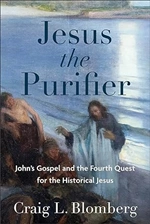
Jesus the Purifier: John’s Gospel and the Fourth Quest for the Historical Jesus
Craig L. Blomberg (Baker Academic)
Blomberg, a prominent New Testament scholar, gives a thorough account of the scholarship that has characterized four distinct “quests” to understand Jesus as a historical figure. As he highlights significant themes and trajectories, he illustrates why the Gospel of John should play a larger role in this research. Blomberg’s argument centers on the motif of Jesus as purifier, showing how—in both John and the other Gospels—he moves beyond a focus on ritual purity to speak of being cleansed and sanctified by the Holy Spirit. John’s gospel has obvious theological value; Jesus the Purifier helps us appreciate its historical value as well. — May Young, associate professor of biblical studies, Taylor University
Award of Merit
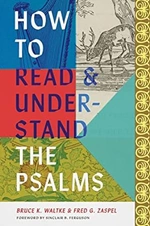
How to Read and Understand the Psalms
Bruce K. Waltke and Fred G. Zaspel (Crossway)
When it comes to works of biblical studies, my ideal is high-level scholarship that connects to pulpits and pews. How to Read and Understand the Psalms is a masterful example, and it now qualifies as my go-to introduction for this section of Scripture. Other introductions are often dry and remote, and even when they accurately dissect specific parts of the Psalms, they can miss the larger point, which is guiding the people of God in speaking to and worshiping God. I have spent a good bit of time working on and thinking about the Psalms, and while reading this book, I was instructed, corrected, and stirred to devotion. — Ray Van Neste, professor of biblical studies, Union University
Finalists
Nobody’s Mother: Artemis of the Ephesians in Antiquity and the New Testament
Sandra Glahn (IVP Academic)
J. Gordon McConville (Baker Academic)
Children
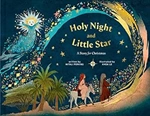
Holy Night and Little Star: A Story for Christmas
Mitali Perkins (WaterBrook)
This original Christmas story is told from the viewpoint of Little Star, a shy yet courageous member of the galaxy, who discovers her purpose in obedience to Maker. On Holy Night, when all the greater stars and planets join with the heavenly host in announcing the Savior’s birth, Little Star learns she has a special part to play as well. Illustrated in muted jewel tones, the brief but lyrical text reads almost like a lullaby. And when Little Star recognizes Maker in the manger, the young reader also learns that “everything was different now, but Maker was the same. Today, tomorrow, forever.” — Pamela Kennedy, children’s author, cocreator of the Otter B series
Award of Merit
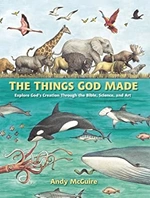
The Things God Made: Explore God’s Creation through the Bible, Science, and Art
Andy McGuire (Zonderkidz)
The story of creation is ubiquitous enough that one might wonder if we need yet another children’s book on the topic. But wonder was, in fact, the word that came to mind as I read The Things God Made. Complemented beautifully by breathtaking artwork, the book has captured the staggering awe that the story of our fascinatingly intricate creation deserves. If we have lost our sense of wonder, McGuire aims to rekindle it. Brilliantly infusing expertise with humility, scientific fact with childlike joy, The Things God Made is a delight. I suspect it will lead readers—children and adults alike—one step beyond wonder and straight into worship. — Hannah C. Hall, children’s writer, author of God Bless You and Good Night
Finalists
Good Night, Body: Finding Calm from Head to Toe
Brittany Winn Lee (Tommy Nelson)
Marvel at the Moon: 90 Devotions
Levi Lusko (Tommy Nelson)
Young Adults
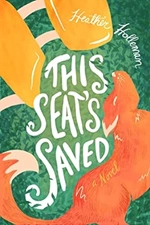
Heather Holleman (Moody)
This Seat’s Saved captures the longing of every teenager in America: belonging. Elita, like so many girls her age, finds herself in a state of friendship adversity. Suddenly, she is excluded from the lunch table by her best friend with the painful statement “This seat’s saved.” Feeling abandoned, she battles fear and loneliness. But in a world that screams at her to fit in, Elita learns that lasting joy comes not from earning the best seat at the lunch table but from receiving the seat God has freely given her next to Christ. — Reese Carlson, youth pastor, author of Church Doesn’t End With Z
Award of Merit
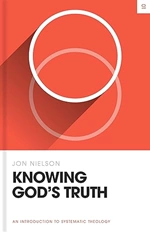
Knowing God’s Truth: An Introduction to Systematic Theology
Jon Nielson (Crossway)
It’s a huge challenge to write a systematic theology book for teens in language they can understand. But Nielson succeeds at this task, helping students grasp deep concepts like eschatology and soteriology. Each chapter contains a Scripture passage that students are encouraged to memorize, as well as pauses where they are invited to pray and reflect on how theological truths can transform their hearts and lives. Nielson does a fine job explaining differing positions on topics like baptism and the end times while leaving space for students to think for themselves. — Jennifer M. Kvamme, student ministries catalyst at Centennial Evangelical Free Church in Forest Lake, Minnesota, author of More to the Story: Deep Answers to Real Questions on Attraction, Identity, and Relationships
Finalists
Do Not Be True to Yourself: Countercultural Advice for the Rest of Your Life
Kevin DeYoung (Crossway)
Hotel Oscar Mike Echo: A Novel
Linda MacKillop (B&H Kids)
Christian Living/Spiritual Formation
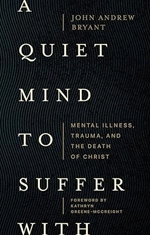
A Quiet Mind to Suffer With: Mental Illness, Trauma, and the Death of Christ
John Andrew Bryant (Lexham Press)
I’ve sat for hours with friends with severe mental illnesses, not understanding in the slightest how they feel or what’s going on inside them. This book gave me a small glimpse into their world and the hope that exists in the life and death of Jesus. It is profound and deeply troubling, lovely and heart-wrenching. I’m both grieved and grateful when I think of the suffering Bryant endured to give us something so wise, true, and beautiful. This book sheds conventional genres, somehow combining memoir, poetry, lecture, sermon, and essay all in one. I left wanting to know more of the patient, quiet trust in Jesus that Bryant found in the halls of the psychiatric ward. — Shar Walker, author and speaker, contributor to His Testimonies, My Heritage
Award of Merit
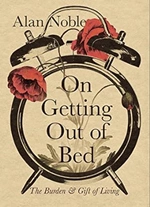
On Getting Out of Bed: The Burden and Gift of Living
Alan Noble (InterVarsity Press)
Noble is unwilling to let us believe the lie that everyone else has it good. Instead, in this short, straightforward book, he affirms that life is hard and full of suffering and that you can’t rely on some technique to fix whatever you’re going through on this side of heaven. To some, such words can feel like a mean, cold shower. But they have the advantage of being refreshingly honest, and they can get the monkey of blame off our backs. Noble encourages readers who struggle to brave each day, reminding them to trust Jesus’ voice above their own emotions. I’m grateful for his reminder that even if we don’t feel right, we have been given the grace to act right. — James Choung, vice president of strategy and innovation, InterVarsity Christian Fellowship USA
(Read Alan Noble’s CT article, “Getting Out of Bed Is an Act of Worship.”)
Finalists
A Longing to Belong: Reflections on Faith, Identity, and Race
Michelle Lee-Barnewall (Zondervan)
(Read CT’s review of A Longing to Belong.)
Made for People: Why We Drift into Loneliness and How to Fight for a Life of Friendship
Justin Whitmel Earley (Zondervan)
(Read CT’s interview with Justin Whitmel Earley.)
Church/Pastoral Leadership
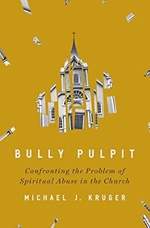
Bully Pulpit: Confronting the Problem of Spiritual Abuse in the Church
Michael J. Kruger (Zondervan)
I lament the need for this book, but its timeliness cannot be overstated. The conversation about spiritual abuse in the church is difficult to navigate because it is challenging to define and diagnose. Kruger gives a clear, biblical definition shaped by humility and pastoral wisdom. He raises his voice for wounded sheep and equips those who advocate for them. He also challenges abusive pastors and the leadership cultures that allow them to flourish. He exhorts churches to identify, repent of, and root out the abusive tactics that are tolerated and affirmed in their midst. This book deserves to be read humbly and prayerfully and applied courageously for the sake of Christ’s flock and the glory of his name. — Brian Key, professor of urban ministry, Grimké Seminary
(Read CT’s review of Bully Pulpit.)
Award of Merit
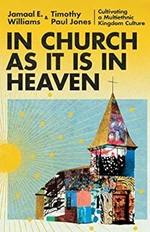
In Church as It Is in Heaven: Cultivating a Multiethnic Kingdom Culture
Jamaal E. Williams and Timothy Paul Jones (InterVarsity Press)
It would be easy to dismiss In Church as It Is in Heaven as just another book on Christianity and race. But its charitable tone and wise counsel make it a must-read for pastors and church leaders. Many books on multiethnic ministry call for repentance, but few provide practical steps to restoration. Williams and Jones augment biblical instruction with personal stories of triumph and failure in a way that is convicting and encouraging. They have guided their own church toward embracing a multiethnic kingdom culture, and their experience provides a blueprint for other churches to follow. — Josh Wredberg, lead pastor at Redeemer Community Church in Fuquay-Varina, North Carolina
(Read an excerpt from In Church as It Is in Heaven.)
Finalists
Pastor, Jesus Is Enough: Hope for the Weary, the Burned Out, and the Broken
Jeremy Writebol (Lexham Press)
The Great Dechurching: Who’s Leaving, Why Are They Going, and What Will It Take to Bring Them Back?
Jim Davis and Michael Graham (Zondervan)
Culture and the Arts
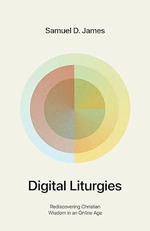
Digital Liturgies: Rediscovering Christian Wisdom in an Online Age
Samuel D. James (Crossway)
James offers a fresh and compelling understanding of how digital media have given rise to various “liturgies” that form its users in underappreciated ways. His book is commendably accessible and engaging for general readers while being firmly grounded in an impressive array of scholarship on social, spiritual, and technological practices. Echoing Marshall McLuhan’s dictum that “the medium is the message,” James argues that the core danger of digital media isn’t objectionable content but its power to inculcate values and habits that run against our eternal calling to glorify God in our hearts and lives. — Rachel Smith, professor of art, Taylor University
(Read CT’s review of Digital Liturgies.)
Award of Merit
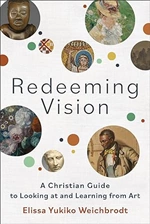
Redeeming Vision: A Christian Guide to Looking at and Learning from Art
Elissa Yukiko Weichbrodt (Baker Academic)
Our Christian faith should inform and affect how we see the world around us. That includes the art we look at, whether in a museum, on a computer screen, or with our smartphone. With engaging prose, Redeeming Vision begins by equipping its readers with some basic analytical principles and vocabulary. The rest of the book—divided into two sections: “Love the Lord Your God” and “Love Your Neighbor as Yourself”—encourages us to respond to art not with a detached disinterest but with a readiness to love God and neighbor, a willingness to analyze, and an openness to be changed by what we see. — Cap Stewart, writer at Unpop Culture
Finalists
The Evangelical Imagination: How Stories, Images, and Metaphors Created a Culture in Crisis
Karen Swallow Prior (Brazos Press)
(Read CT’s review of The Evangelical Imagination.)
John Dyer (Oxford University Press)
(Read an excerpt from People of the Screen.)
Fiction
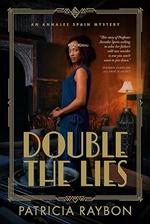
Patricia Raybon (Tyndale)
The mid-1920s conjure images of flappers, jazz, and speakeasies. For some, however, it was a time of suppression, racial injustice, and undiluted bigotry, a time when the KKK could pull the strings of local police departments and threaten Jews, Catholics, and especially African Americans without consequence. This is the setting for Double the Lies, the second novel in a series revolving around Annalee Spain, a determined Black woman with a knack for solving crimes. She sets out to solve the murder of a man she first saw in the local library, which is complicated by the unexplained disappearance of her boyfriend, a local Black pastor. Raybon weaves a well-paced, gripping story tailor-made for mystery lovers. — Alton Gansky, novelist, writing mentor
Award of Merit
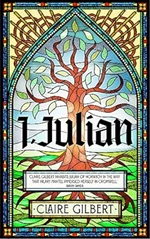
I, Julian: The Fictional Autobiography of Julian of Norwich
Claire Gilbert (Hodder Faith)
If a faith journey can ever be described as a “slow burn,” then the term might apply to this fictional autobiography of the medieval mystic Julian of Norwich. At first, as a reader with few leisure-reading hours in my day, I wondered if I could endure the slow unfolding. But I’m so glad I did. Gilbert knew what she was doing in her deliberate pacing, which works both to preserve historical accuracy and to dramatize the knothole of Julian’s passage to faith. I felt her hunger, both physical and spiritual, and I could believe I was living her experience, so different from my own. I, Julian is a wonderful reminder that part of the mystery of fiction is its capacity to lighten the heart, give an adrenaline kick, and strip away preconceptions. — Cynthia Ruchti, novelist, speaker, literary agent
Finalists
Liam Callanan (Dutton)
Susie Finkbeiner (Revell)
History/Biography
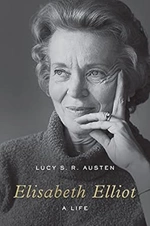
Lucy S. R. Austen (Crossway)
Elisabeth Elliot was one of the most revered and influential American Christians in the second half of the 20th century and one of the most famous women in modern missionary history. In this intimate account, Austen has delivered a brilliant rendering of her life. Her compassionate but clear-eyed biography pulls back the curtain on evangelical hero-making, shedding light on the habits and beliefs of an entire subculture. Richly laced with primary sources, the book inspires Christian devotion while also showing the human frailties of those desperately trying to serve Christ amid adversity and suffering. Austen’s book deserves a wide readership both within and outside of North American evangelicalism. — Darin D. Lenz, professor of history, Biola University
(Read CT’s review of Elisabeth Elliot: A Life.)
Award of Merit
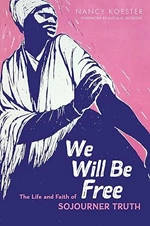
We Will Be Free: The Life and Faith of Sojourner Truth
Nancy Koester (Eerdmans)
At times heartbreaking and heartwarming, We Will Be Free examines afresh the life and times of Isabella Baumfree, the liberated slave who took the name Sojourner Truth after her dramatic conversion to Christian faith. The book combines careful historical research with adept storytelling, vividly portraying her remarkable impact as an abolitionist and campaigner for women’s equality. Koester makes skillful use of the available source material, painstakingly recreating the life of a woman who never learned to read or write. Her book offers a wonderful example of how faith and social justice can join hands to change society. — Rachel Ciano, lecturer in Christianity in history, Sydney Missionary & Bible College
(Read CT’s review of We Will Be Free.)
Finalists
Timothy Keller: His Spiritual and Intellectual Formation
Collin Hansen (Zondervan)
(Read CT’s joint review of Timothy Keller and Beth Moore’s All My Knotted-Up Life.)
Age of the Spirit: Charismatic Renewal, the Anglo-World, and Global Christianity, 1945–1980
John Maiden (Oxford University Press)
Marriage and Family
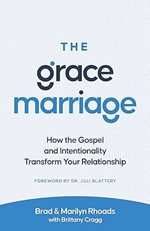
The Grace Marriage: How the Gospel and Intentionality Transform Your Relationship
Brad and Marilyn Rhoads (Moody)
This is a fantastic book. It is thoroughly grounded in Scripture, informed by and consistent with the best research on what builds satisfying and lasting marriages. Though it directs couples with serious problems to counseling, as appropriate, it focuses on the pathway from ordinary to excellent marriages, rooted in relationships drenched in grace. As someone who has researched and taught on marriage for decades, I would choose this book in a heartbeat for a marriage enrichment experience in my church. — David Ayers, professor of sociology, Grove City College, author of Christian Marriage: A Comprehensive Introduction
Award of Merit
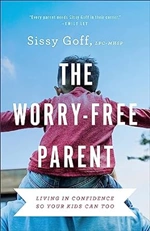
The Worry-Free Parent: Living in Confidence So Your Kids Can Too
Sissy Goff (Bethany House)
Parenting and anxiety go together like ice cream and chocolate chips. Given the amount that can go wrong, it’s amazing any parent manages to stay sane. Goff’s wealth of clinical experience paired with a Christian worldview provides realistic and helpful advice for harried and worried parents. She walks through major errors parents can make as they seek to raise their kids in a positive, healthy manner. — Nate Brooks, associate professor of counseling, Southeastern Baptist Theological Seminary
Finalists
How to Stay Married: The Most Insane Love Story Ever Told
Harrison Scott Key (Simon & Schuster)
(Read CT’s review of How to Stay Married.)
Talking to Kids about Gender Identity: A Roadmap for Christian Compassion, Civility, and Conviction
Mark Yarhouse (Bethany House)
Missions/Global Church
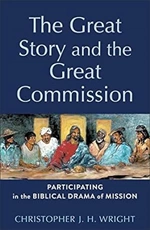
The Great Story and the Great Commission: Participating in the Biblical Drama of Mission
Christopher J. H. Wright (Baker Academic)
As believers, we are part of God’s grand eternal story, and we have a job to do for his glory. Wright encourages us to read the Bible in this light, asking, “What does it mean to realize that we are ‘in the Bible,’ in the sense that we actually participate in the story it tells and the plan it unfolds, in the era between the resurrection and the return of Christ?” Each chapter presents a careful examination of various facets of mission, prompting healthy engagement with Scripture and leading us to remember that, since Jesus is Lord of all, we must continually cast our own “alls” at his feet. — David Hosaflook, executive director of the Institute for Albanian and Protestant Studies
Award of Merit
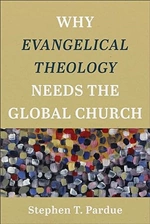
Why Evangelical Theology Needs the Global Church
Stephen T. Pardue (Baker Academic)
Pardue has written a unique volume that significantly advances the discussion of global theology among evangelicals. Respectfully acknowledging the hesitations of Western evangelicals, Pardue carefully, thoughtfully, and convincingly argues that the global church is a gift from God. We need each other, and the cultural and historical diversity of the global church across the ages brings God greater glory. — Susan Maxwell Booth, professor of evangelism and missions, Canadian Baptist Theological Seminary and College
(Read CT’s interview with Stephen Pardue.)
Finalists
Faithful Disobedience: Writings on Church and State from a Chinese House Church Movement
Edited by Hannah Nation and J. D. Tseng (IVP Academic)
(Read an excerpt from Faithful Disobedience.)
Before You Go: Wisdom from Ten Women Who Served Internationally
Edited by Emily Bennett (B&H)
(Read a Top 5 Books list from Emily Bennett.)
Politics and Public Life
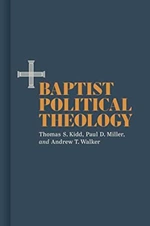
Edited by Thomas S. Kidd, Paul D. Miller, and Andrew T. Walker (B&H Academic)
Baptists have often been misunderstood as being one-dimensional, lacking a developed body of thought in political theology. The editors of Baptist Political Thought have assembled a group of scholars who demonstrate the vitality and diversity of Baptist thought on politics and religion, dealing insightfully with the tradition’s successes and failures alike. Some contributors tackle broad historical topics like the relationship between Baptists and the Reformation or the American Revolution, as well as early interdenominational debates on religious liberty, slavery, and social justice. Others take on contemporary challenges like sexuality and gender, environmentalism, and just war theory. — John Wilsey, associate professor and chair of the department of history, Southern Baptist Theological Seminary
Award of Merit

Religious Liberty in a Polarized Age
Thomas C. Berg (Eerdmans)
Religious liberty is a fundamental part of the American political order. But in many current conversations, it has taken on a controversial edge, often functioning as a flash point in our culture wars. In this thorough book, Berg argues that religious liberty, rather than being a prescription of uniformity, is both a remedy for divisiveness and an essential safeguard for genuine pluralism and cultural diversity. Religious Liberty in a Polarized Age is a must-read for all who find themselves engaging in the public square, and it gives valuable insight into the current legal and ideological landscape. — Katie Frugé, director of the Center for Cultural Engagement at Texas Baptists
(Read Thomas Berg’s CT op-ed, “Religious Liberty Doesn’t Have to Make Polarization Worse.”)
Finalists
Just Discipleship: Biblical Justice in an Unjust World
Michael J. Rhodes (IVP Academic)
(Read CT’s review of Just Discipleship.)
Kaitlyn Schiess (Brazos Press)
Theology (popular)
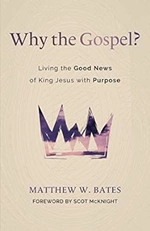
Why the Gospel? Living the Good News of King Jesus with Purpose
Matthew W. Bates (Eerdmans)
I live in a heavily forested area, and my children are accustomed to tromping through the woods. When we visited a national forest recently, they recited a pledge to become Junior Rangers and had badges pinned to their chests. I’ve spent most of my life as a follower of Jesus, studying the Word and sharing my faith with countless people. After reading this book, though, I felt as though my heart had been pinned with a “King Jesus” badge. I’ve understood the “what” of the Good News, but after delving more fully into the “why,” I’ve discovered even greater depths to biblical messages of salvation, glory, and divine kingship. For new and mature believers alike, Bates’s book can rekindle a living allegiance to King Jesus. — Rachel Lynn Lawrence, founder of Momma Theologians
(Read Matthew Bates’s CT article, “‘Conscious Uncouping’ from the Church Is the New Temptation.”)
Award of Merit
Hope for God’s Creation: Stewardship in an Age of Futility
Andrew J. Spencer (B&H)
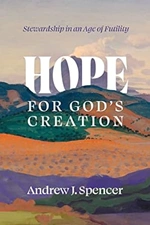
In Hope for God’s Creation, Spencer lays out a compelling argument that orthodox evangelical theology establishes the foundation for an ethic of creation care. Scripture begins with the declaration that God is the Creator and what he made is good. Creation reveals the character of the Creator (Rom. 1), and Scripture calls us to be good stewards of that creation. The church’s primary mission is evangelism, but evangelism cannot be separated from the call to righteous living. Caring for creation is an act of obedience to God, and it makes life on this planet—while we await the new creation—better for all living things. — Glenn R. Kreider, professor of theological studies, Dallas Theological Seminary
Finalists
Ordinary Splendor: Living in God’s Creation
Lydia Jaeger (Lexham Press)
God, Gift, and Guide: Knowing the Holy Spirit
Gregg R. Allison (B&H)
Theology (academic)
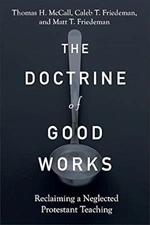
The Doctrine of Good Works: Reclaiming a Neglected Protestant Teaching
Thomas H. McCall, Caleb T. Friedeman, and Matt T. Friedeman (Baker Academic)
The authors of this book make the case that more attention should be given to Christians doing good works or, to use John Wesley’s term, “works of mercy.” Alongside a variety of Protestant theologians and confessions, they draw on key Old and New Testament teachings. The book demonstrates that, historically, many Protestants have noted the significance and necessity of good works, even if today the doctrine is often neglected in discussions of salvation or buried under a one-sided concern for salvation by faith alone. Later chapters apply these teachings to local congregations, highlighting churches that make the corporate practice of good works a major ministry focus. — Adam Harwood, professor of theology, New Orleans Baptist Theological Seminary
(Read CT’s review of The Doctrine of Good Works.)
Award of Merit
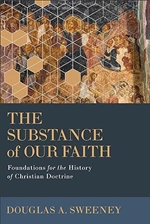
The Substance of Our Faith: Foundations for the History of Christian Doctrine
Douglas A. Sweeney (Baker Academic)
This book offers an excellent introduction to Christian theology that is rooted in both classic Christian tradition and key contemporary theological and missiological trends. The content is both accessible and detailed, making the book an ideal text for both graduate and undergraduate students of theology. — Jennifer Rosner, affiliate associate professor of systematic theology, Fuller Theological Seminary, author of Finding Messiah
Finalists
The Trinity in the Canon: A Biblical, Theological, Historical, and Practical Proposal
Edited by Brandon D. Smith (B&H Academic)
Beyond Immanence: The Theological Vision of Kierkegaard and Barth
Alan J. Torrance and Andrew B. Torrance (Eerdmans)
Book of the Year

Biblical Critical Theory: How the Bible’s Unfolding Story Makes Sense of Modern Life and Culture
Christopher Watkin (Zondervan Academic)
Written in the spirit of Augustine’s City of God, Biblical Critical Theory has the potential to carve out new conversations and areas of inquiry regarding how Christian teaching on creation, anthropology, sin, society, redemption, and consummation ought to guide and govern our understanding of contemporary life. It is a significant piece of scholarship that capably interacts with an array of disciplines from philosophy and social theory to theology, ethics, and biblical studies. While the book is demanding given its length and density at many points, it will certainly have a significant downstream effect on how Christians approach cultural witness. It is a foundational work that will, in time, provide the basis for many fruitful projects in Christian social theory. While I have notable philosophical disagreements with certain points of application, I think the book successfully demonstrates the enduring relevance of the Christian story as a lens through which we can make sense of our world. — Ross D. Inman, associate professor of philosophy, Southeastern Baptist Theological Seminary
Despite its daunting size and scope, Biblical Critical Theory poses a simple question: “So what if the Bible is true?” What difference would its story make for our understanding of and engagement with contemporary society and culture? With that question in view, Watkin sets out on a recovery mission, drawing together an impressive range of insights from culture, intellectual history, and Scripture to paint a remarkably coherent and compelling picture of life inside the biblical narrative. In so doing, he turns modern critical theory on its head and models how Scripture can simultaneously critique our culture and offer a rich and satisfying alternative. — Marybeth Baggett, professor of English and cultural apologetics, Houston Christian University
(Read an excerpt from Biblical Critical Theory, as well as an interview with the author.)
Our Book Awards Process
How do we choose the winners of the CT Book Awards? The process, in a nutshell, works like this: Publishers (and individual authors) can nominate as many books as they wish, in as many categories as they wish, provided (this time around) that they were published between November 2022 and October 2023. Various CT editors then sort through the resulting pool of nominees and determine the four finalists in each category. From there, the finalist books go to category-specific panels of four or five judges—pastors, theologians, scholars, writers, and the like—who assess both their overall quality and their worthiness for evangelical readers.
- Print & Digital Issues of CT magazine
- Complete access to every article on ChristianityToday.com
- Unlimited access to 65+ years of CT’s online archives
- Member-only special issues
- Learn more


